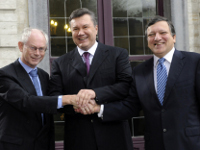Registration
You will receive an email confirming your registration.
IMGXYZ3106IMGZYXThe European Union is keen to strengthen its relations with Ukraine, as illustrated by recent negotiations for a Deep and Comprehensive Free Trade Agreement (DCFTA), which is part of a future Association Agreement. However, some member states are wary of the lack of democracy and the weak rule of law in the country. In addition, Russia has invited Ukraine to join its Customs Union, a move that could jeopardize negotiations over a DCFTA. In a video conference co-hosted by Carnegie Europe and the Institute of World Policy in Kyiv, Carnegie’s Olga Shumylo-Tapiola moderated a discussion with Philippe Cuisson, deputy head of European Union Bilateral Relations- Europe (non-EU) & Central Asia at the European Commission and the Commission’s chief negotiator on a free trade agreement with Ukraine, and Ina Kirsch, representative of the Policy Department of the Directorate-General for EU External Policies at the European Parliament.
Positive Developments for a DCFTA
- An Optimistic Outlook: Both Ukraine and the EU are optimistic that an agreement on a DCFTA can be reached by the end of the year, Cuisson said. In the mid to long term, a DCFTA will help Ukraine modernize its economy, import economic governance, and attract European foreign direct investment, he added.
- DCFTA or Customs Union?: Russian pressure on Ukraine to join its Customs Union, a step that would prevent Ukraine from signing a DCFTA, has prompted concerns in the EU, Cuisson and Kirsch explained. As a member of the Customs Union, Ukraine would not be solely responsible for its borders. In addition, Russia and its partners within the Customs Union are not members of the World Trade Organization, a prerequisite for the EU to sign a free trade agreement with Ukraine. European fears were assuaged, however, by Kyiv’s announcement that it would join the DCFTA and would cooperate with the Customs Union without joining it, Cuisson and Kirsch said.
- Geographic Indications: One critical issue within the DCFTA for Ukraine is that of geographic indications. These are the signs used on products with a specific geographical origin that possess particular attributes that are linked to that place of origin. Ukrainian companies use product names patented in the EU to produce local products that bear little resemblance to the originals, such as champagne. As a result of a DCFTA, Ukraine will have to rebrand such products. The European Commission knows this will be a costly and painful process, but is willing to assist Ukraine technically and financially, Cuisson said.
- Action Needed Now: Once an agreement is reached, it will need to be ratified by the European Parliament and Ukraine’s parliament, the Verkhovna Rada. Bureaucratic procedures, such as translating the agreement into all 23 EU languages, will take several months, and could lead to a gap of up to or in excess of a year between the signing of the agreement and its entry into force, Cuisson explained. With elections for the European Parliament approaching in 2014, Kirsch warned that if Ukraine fails to comply with EU requirements swiftly, it could delay the entire process, as well as delay negotiations over visa liberalization.
Concerns over Ukraine’s Path
- European Concerns: Kirsch and Cuisson highlighted their concern about worrying trends in Ukraine, such as the lack of transparency in the political decision making process, state monopolies, and rampant corruption.
- Ukraine’s Domestic Issues: The EU recognizes that President Viktor Yanukovych may face internal pressure, especially from oligarchs, to favor certain sectors of the economy. This could even damage closer cooperation with the EU in negotiations over the DCFTA, and more broadly the Association Agreement. The Union, however, regards these as domestic political issues and does not feel compelled to interfere, Kirsch said. The EU, and particularly the European Parliament, does not consider Ukraine a major trading partner, but sees cooperation with Kyiv through the prospect of possible eventual membership. The EU therefore expects Ukraine to fulfill certain criteria and undertake positive political changes, Kirsch said.
